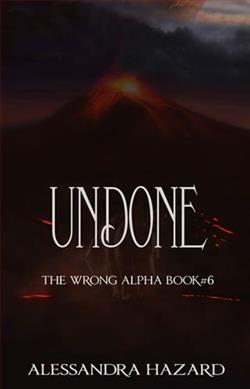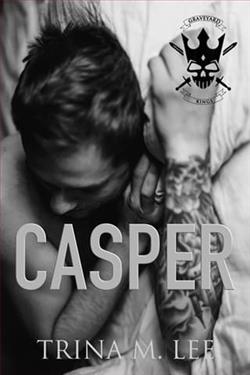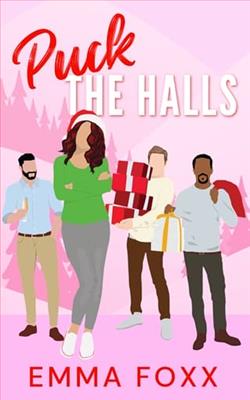Page 3 of The Monster's Daughter
"Jamie," I say again. Her name tastes like salt and old laughter.
She looks up at me with eyes that are wider than pain should allow. Her mouth works. Her voice comes out like a feather dragged over a drum. "Kage," she whispers, and it is the small, private sound that used to sit in the quiet corners of my life. For one instant, for one impossible moment, the war hasn't swallowed us yet.
"Tell me where they—" I start, but my hands are useless. They shake, so I clamp down on them and grumble. The world becomes a tight thing around her ribs.
She coughs, blood in the corner of her mouth, then forces out a sentence on a tide of breath that sounds like it could lace the sky. "Your—parents," she says. The way she says it turns intoprayer and it stabs me in a place that has been missing part of itself for too long. "Go. Find them. Please. Maybe—they?—"
Don't make this a wish. Don't make this a promise you let go of.
I lean down and put my forehead to hers, because my hands are covered in someone else's dying and I don't want my eyes to start leaking. I don't know how to say thank you. There's nothing to say for this small kindness. She smiles, a little thing like a cracked bell, and then the light on her face goes out. Her breath stutters and stops warm against my scales.
I begin to roar.
The sound that comes from my chest is not human, not tame. It splits the sky. The empty buildings answer with a keening that bleeds back into me. I scream for them all—my parents, my deli, every friendly face that ever gave me a loaf and two jokes across a counter. The scream is a promise and a curse and I let it out until my throat is raw and the soles of my feet ache with the force of it.
No one answers. Lurax takes and takes.
When the echo fades, I am a thing made of broken edges. I drag Jamie into what passes for shade and sit very still until the heat and the adrenaline bleed out of me. When the blood stops making noise in my ears, I wash my hands at an overturned water tank and the water runs pink. My claws have bits of cloth and bone stuck under them and for a moment I think of how Jamie used to roll her sleeves and say, "If you're going to cook for someone, you don't skimp on the spice." The memory is a cut that heals and keeps you whole.
I don't hear the medics until they come.
They move like hopeful goats, a cluster of uniforms and white and patchwork. There's a woman barking orders at the top of some shallow throat; the IHC... the human band—someone I know, because humans always try to be in the center of anythingthat might get them medals. They're cautious as they step over the bodies. They scan, and they radio, their voices bright like lights over a graveyard.
Anger is a slow burn now, an ember under a tongue. It simmers, and it makes my jaw ache. They are medics—good. They are also Alliance-bundled people, and they sniff around like they own the place. They pick at the bodies, they poke, they measure. One of the medics coughs and I smell caffeine on his breath. He tastes like warm metal and too much coffee and cheap luck.
They move near the street where I sit, where Jamie lays folded like the last note of a sad song. They bend down without asking. One of them touches her hair and says, "We lost—" and the number is flippant, like a tally on a ledger. My hands find a weapon before the thought is even formed. I do not want to be the connoisseur of their momentary shock.
I wait in the shadows. I let them breathe. I let their ignorance be the rope I will use to drag them into truth.
They are not careful. They never are, not when they have the illusion that a day will end with medals and a parade. They laugh at something—too loud—then freeze because the air changes. They should have seen it on their thermal screens: me, a black shape against the lighter dust, a ghost with too much hunger. But the tech is no match for old skill and worse intent.
I move, and it is simple. Metal and body and instinct combine and they find themselves on the ground with blood blooming and the taste of fear in their mouths. They try to reach for their weapons and I crush their hands and snap bones until the noise is loud enough to wake even the dead. I am precise and I am not gentle. Violence becomes a language I have learned to speak without thinking.
When it's over, I'm standing in a small ring of ruined bodies while the medics stare at me as if they've seen the angel of theirdeaths. One of them, a woman with red hair pulled tight, looks at me with all the professional command she can pull together. "Who are you?" she demands, though I can hear the tremor. My head is a crown of static.
"Kage," I say. My name slips out like a basalt coin. The human word tastes like ash. "Grolgath."
She says more—about treaties, about reprisal, about reporting—but her voice is threadbare. She keeps glancing at the IHC badge on the sleeve of her uniform and then back at me. I can see a brain trying to organize a plan, but it is too small for what is happening. She keeps her hands where he can see them. Her fingers twitch.
"She told me to find them," I say. My voice is low and it folds over the cracked street like a shadow. "My parents."
The medics shift, and then she snaps, "We can help. We have transport. We can?—"
"Your talk is for when your engines bring you medals," I say. My patience is brittle. "Your words do not matter. I want people to help me find them or I will take what I need by other means."
She opens her mouth—human lungs working—then closes it as if some invisible hand folded it shut. The man with the coffee breath says something like, "We can't be seen helping an Ataxian?—"
"Vakutans," I correct him, the word like a blade. "They will not thank you for your loyalty."
He stumbles back as if I spat. He reaches for his radio. His fingers are wrong. My claw finds his wrist and squeezes until he tastes the iron he swore he'd never like.
The leader—she keeps looking at me, measuring me with all the clinical training in her bones. In her pocket is a medikit. Her hands are shaking. I want to tell her: You have what you came here for. Leave your shiny moral codes in your pocket and giveme a way to get off this rock with my family. But I don't speak like that. I speak like hunger.
Her lips press into a thin line. Then footsteps on rubble take my attention.
They are a different group, coming in from the other street. Not Alliance—something else, quieter. Boots that are not on a clock. And in that group, a woman stumbles into view—mud crusted at her knees, hair a hot blaze threaded with grime, eyes like knives. She is small, but the way she moves is fast and precise. There is a hate in her face that matches the desert in my chest.
She locks onto me and stops, and then something in the human band's reaction sharpens. One of them says, "Medic—" and there's a flippant note, like they think this is a rescue. The woman notices the IHC badge on her arm before the others do. Her eyebrows pinched together as if tasting betrayal. She looks at me—really looks—and something flashes there. Not pity. Not at first.















